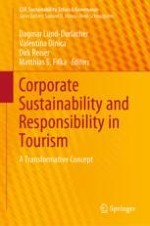This book offers essential insights into how the world's second largest industry, tourism, is responding to challenges involved in expanding the corporate social responsibility (CSR) concept to corporate sustainability and responsibility, referred to as CSR 2.0. It analyzes the typical setup of tourism with various types of commercial agents: corporations, small and medium sized enterprises, public-private partnerships, social enterprises and local cooperatives. In addition, the book examines a broad range of voluntary initiatives, the effectiveness of these efforts, and how contextual and wider policy features shape these relationships.
The book is divided into three parts, the first of which elaborates on strategic drivers and rationales for CSR. In turn, the second part introduces readers to design approaches for CSR programs and envisaged impacts, while part three focuses on implementation, certification, reporting, and possible outcomes. Each part offers a mixture of theoretical perspectives, synthesis analyses and case studies. The respective chapters tackle a broad spectrum of tourism sub-sectors, e.g. the cruise industry, aviation, gastronomy, nature-based tourism, and urban destinations.
